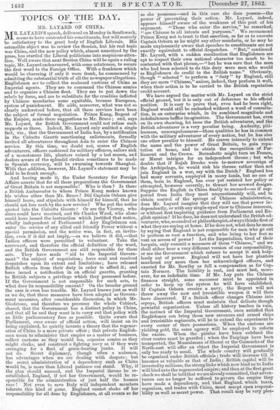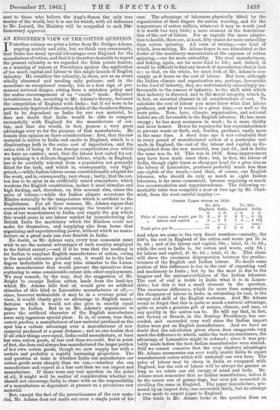TOPICS OF THE DAY.
MR. LAYARD ON CHINA.
Air R. LAYARD'S speech, delivered on Monday in Southwark, AU seems to have contented his constituents, but will scarcely be satisfactory to the great body of English Liberals. His ostensible object was to review the Session, but his real topic was China, and the new policy which, almost unnoticed by the press, has startled the Liberal politicians into suspicious atten- tion. Well aware that next Session China will be again a ruling topic, Mr. Layard endeavoured, with some astuteness to secure the first word to the Foreign Office. With a frankness which would be charming if only it were frank, he commenced by admitting the substantial truth of all the newspaper allegations. Englishmen are to collect the seaboard customs of China as Imperial agents. They are to command the Chinese armies and to organize a Chinese fleet. They are to put down the rebels by force, and are to substitute for the cruelties inflicted by Chinese mandarins some equitable, because European, system of punishment. He adds, moreover, what was not so clearly understood before, that all these services have been the subject of formal negotiation. Prince Rung, Regent of the Empire made these suggestions to Mr. Bruce ; and, says Mr. Layard, the British Government could not refuse such requests as these. Indeed, Mr. Layard only omitted a single
fact, viz., that the Government of India has by a notification in the Calcutta Gazette sanctioning enlistments, formally
invited all adventurers throughout Asia to enter the Chinese service. By this time, we doubt not, scores of English adventurers, officers cashiered for military offences, sailors sick of a monotonous life, planters ruined by a bad season, and dealers aware of the splendid strokes sometimes to be made in Spanish currency, will be swarming towards Shanghai. With that addition, however, Mr. Layard's statement may be held to be frank enough.
And having made it, the Under Secretary for Foreign Affairs asserts that for all these preparations the Government of Great Britain is not responsible! Who is then ? Is there British Ambassador to whom Prince Rung makes known i
h wishes other than Mr. Bruce ? Did Captain Osborn give himself leave, and stipulate with himself for himself, that he should not lose rank by the new service? Who put the notice quoted into the Calcutta Gazette, Or are the Viceroy, who alone could have received, and Sir Charles Wood, who alone could have issued the instruction which justified that notice, wholly independent of Parliament? Any Englishman can enter the service of any allied and friendly Power without a special permission, and the notice was, in fact, an invita- tion, even if it did not imply,—as we believe it did,—that Indian officers were permitted to volunteer. Take the siarrowest, and therefore the official definition of the word, and the British Government are still responsible for these acts. They have made "aid to the Imperial Govern- ment" the subject of negotiation; have sent and received despatches upon its extent and limitations; have released British officers from their duty in order to afford it; and have issued a notification in an official gazette, granting to British subjects a privilege which they possessed before. If the Government is not responsible for such acts, to what does its responsibility amount? On the broader ground the ease is even less tenable. Mr. Layard knows just as well as we do, that these measures have been adopted as Govern- ment measures, after considerable discussion, in which Mr. Gladstone and therefore we presume the whole Cabinet, shared, that the Government has a distinct policy in China, and that all he and they want is to carry out that policy with as little parliamentary fuss as possible. Quite aware that Parliament, once aware of official action, will insist on its being explained, he quietly invents a theory that the regener- ation of China is a mere private afthir ; that private English- men mean to administer that empire as a matter of business, collect customs as they would tea, organise armies as they might clerks, and construct a fighting navy as if they were arranging for a fleet of grain-bearing junks. It will
not do. Secret diplomacy, though often a nuisance, has advantages when we are dealing with despots; bat the secret administration of a dependency such as China would be, is more than Liberal patience can stand. Why, if the plan should succeed, and the Imperial throne be re- established, England, if not her Government, would be re- sponsible for the administration of just half the human race ! Not even to save Italy will independent members tolerate this kind of game. England cannot shake off her responsibility for all done by Englishmen, at all events so far as she possesses—and in this case she does possess—the power of preventing their action. Mr. Layard, indeed, appears himself aware of the weakness of this part of his argument. "Those who enter the service," he remarked, "arc Chinese to all intents and purposes." We recommend Prince Rung not to trust to that assertion, so far as to execute Captain Osborn as he might any other mandarin, or he may be made unpleasantly aware that speeches to constituents are not exactly equivalent to official despatches. "But," continued Mr. Layard, with a sudden recollection that Englishmen are apt to respect their own national character too much to be contented with that phrase —" but he was sure that the men who had been selected to do this duty were men who would as Englishmen do credit to the British name." Obviously, though " selected " to perform a " duty " by England, still they are mere "Chinese," unless, indeed, they perform it well, when their action is to be carried to the British reputation credit account.
We have argued the matter with Mr. Layard en the strict official ground, but it is only out of deference to his official position. It is easy to prove that, even had he been right, England would still be embarked without a word of consulta- tion, in an enterprise which, in its combined magnitude and indefiniteness baffles imagination. The Government has, even on its own showing, let loose the British adventurer and the British adventurer is a very peculiar being. Audacity, piti-
lessness, unscrupulousness—these qualities he has in C001111011
with the military adventurer of every nation, but he has also one other peculiar to himself. He craves intensely to extend the name and the power of Great Britain, to gain repu- tation at home, and to obtain the recognition of Par- liament and the Crown. Bernadotte might turn on France, or Murat intrigue for an independent throne ; but who doubts that if Rajah Brooke were to-morrow sovereign of the Archipelago, he would risk his throne rather than not join England in a war, say with the Dutch? England has had many servants, employed in many lands, but no one of them, born in England, has ever yet resisted her policy or attempted, however covertly, to thwart her avowed designs. Suppose the English in China finally to succeed—as if sup- ported from India they most unquestionably will, and to obtain control of the springs of Chinese administration,
does Mr. Layard imagine that they will use that power in- dependently, or with any single-eyed view to Chinese interests,
or without first imploring guidance from Parliament and En- glish opinion? If he does, he does not understand the British ad- venturer, who, scoundrel or philanthropist, al ways thinks first of what theyare saying at home. If he does not, what does he mean by saying that England is not responsible for men who go out to perform so vast a function, and who bring to her feet so vast an access of power? Let the Imperialists, tired of their bargain, only commit a massacre of these "Chinese," and we shall either hear a very different version of our responsibility, or see the Government which refuses to accept it sink help- lessly out of power. England will not have her planters murdered any more than her acknowledged officers, and exacted for Mr. Bowlby as full a compensation as for Cap- tain Norman. The liability is real, and must last, more- over, for an indefinite time. If Mr. Lay puts the Chinese finances straight, some successor must be appointed in order to keep up the system he will have established. If Captain Osborn creates a navy, the Regent will not throw away the new and irresistible weapon it will then have discovered. If a British officer changes Chinese into sepoys British officers must maintain that delicate though powerful organization. Unless all history teaches in vain, the instinct of the Imperial Government, once satisfied that Englishmen can bring them new revenues and armed ships and irresistible regiments, will be to extend the experiment to every corner of their possessions. When the customs are yielding gold, the same agency will be employed to reform the excise. When the pirates have been subdued the river routes must be guarded ; when the Taepings have been transported, the Mussulmans of Shensi or the Calmucks of the North-east will offer an object the Imperial Government is only too ready to assail. The whole country will gradually be organized under British officials • trade will increase till it becomes as valuable as that of India ; British capital will be invested by millions; the stronglinks which now bind us to India will bind us to the regenerated empire • and then at the first great check we shall be told that wearealreddy committed, that adven- turers can no longer be suffered to govern the empire they have made a dependency, and that England, which taxes, organizes, and trades with China, must accept open responsi- bility as well as secret power. That result may be very plea- sant to those who believe the Anglo-Saxon the only true master of the world, but it is one for which, with all deference to Mr. Layard, the Ministry will be compelled to seek Pal.: liamentary approval.































 Previous page
Previous page